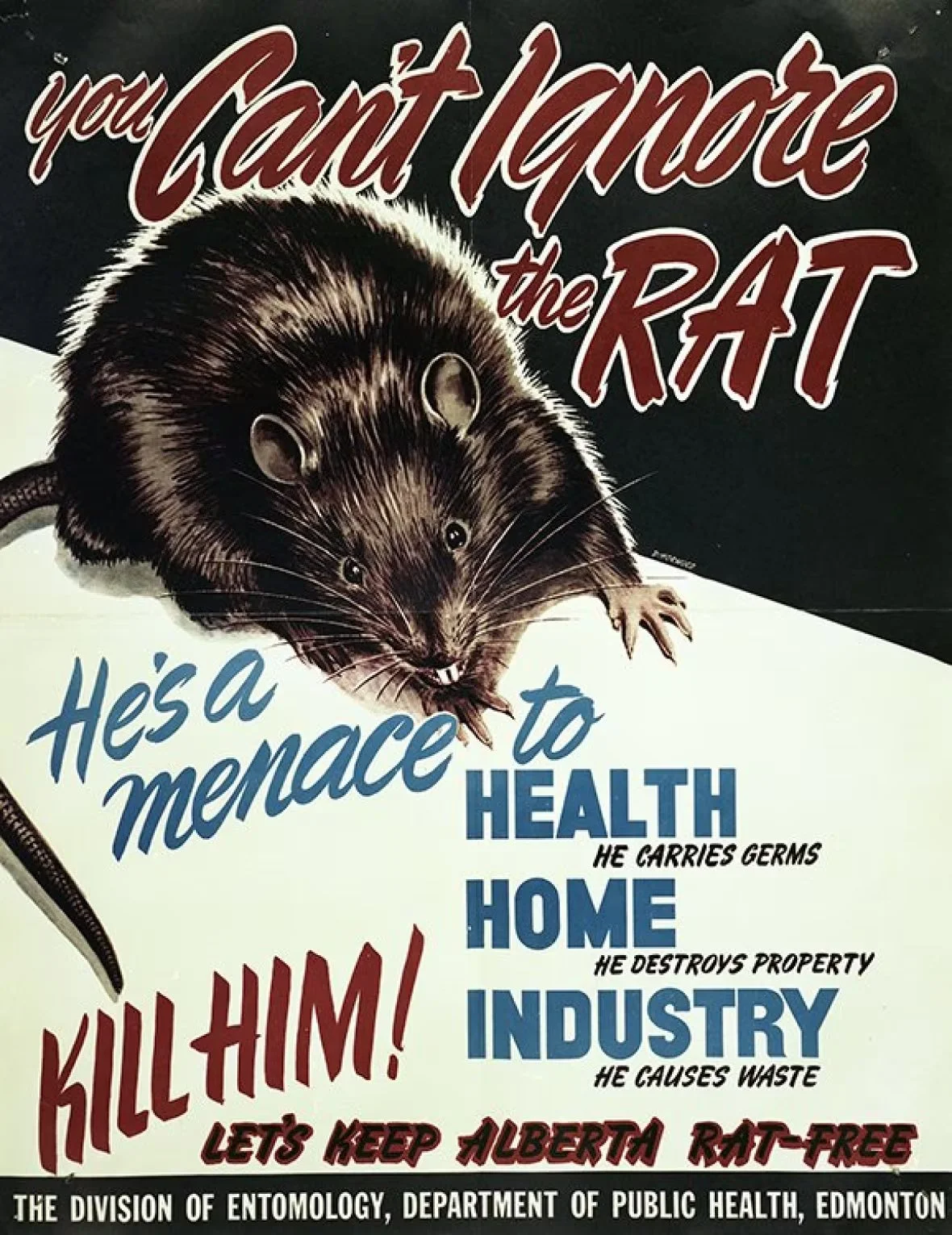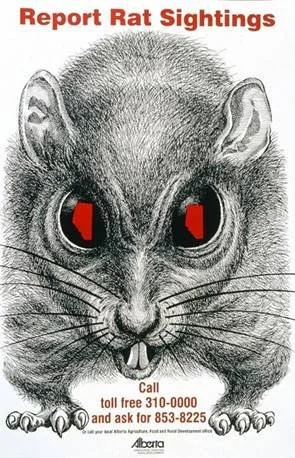Rat Academy schools audiences on the history of Alberta’s anti-rat propaganda
Physical-comedy duo Katie Yoner and Dayna Lea Hoffmann of the Batrabbit Collective play the province’s last two rats on a mission for survival
Rat Academy. Photo by Marc Chalifoux
Pi Theatre presents Batrabbit Collective’s Rat Academy from December 5 to 7 at a secret venue in East Vancouver as part of the Pi Provocateurs series
IT WAS THE summer of 1950 on a farm in Alberta, not far off from the southeastern Saskatchewan border village of Alsask, when field crews from the Alberta Department of Health discovered that the province’s very first Norway rats had scurried across the border.
So began Alberta’s militant crackdown on the rodents. Rats were declared a pest under local legislation for their potential to destroy crops and livestock, and in 1953, arsenic-trioxide tracking powder was used across more than 8,000 buildings on 2,700 farms to halt the creatures’ westward expansion. The province has been nearly devoid of the rodents ever since (aside from the odd hitchhiker that sneaks in by cargo), making it the largest rat-free jurisdiction in the world. Today, there remains a 600-kilometre-long Rat Control Zone along the Alberta–Saskatchewan border (which sounds comical, but is very much real), and anti-rat propaganda on how to identify the rodents and report sightings continues to be taught in schools.
Such a distinct piece of history is certainly grounds for a good story—which is why physical-comedy duo Katie Yoner and Dayna Lea Hoffmann of the Batrabbit Collective decided to turn it into a show about the last two surviving rodents in the province, with director Joseph McManus. Called Rat Academy, the production stars Hoffmann as Fingers, a curmudgeonly street rat who’s well-versed in scrappy survival skills, while Yoner is Shrimp, an escaped lab rat whose gleeful, carefree attitude needs some fine-tuning if he’s going to make it out in the real world. So Fingers starts up a Rat Academy to train Shrimp in what are arguably the most important skills a rodent can have: Cheese-ology, the Art of Scaring Magpies, Stealing 101, and Advanced Tails.
Poster released by the Alberta Department of Public Health in 1948. Photo courtesy the Provincial Archives of Alberta
Poster used by Alberta Agriculture in 1990.
Yoner, who was raised in Calgary and is now based in Edmonton, confirms that Alberta’s still essentially rat-free. So naturally, finding her first rat out in the wild was a big deal.
“I had never even seen a rat in person until we started touring the show, and someone actually brought their rat,” Yoner tells Stir animatedly over a joint phone call with Hoffmann. “And in Toronto, when we were there, I saw a live wild rat for the first time….I think Dayna has it on video. I was so excited, because we had gone to Vancouver previously, and Joseph saw a rat in a bush somewhere, and I wasn’t there—and I was so upset that I still had never seen a wild rat. And then finally in Toronto, walking down back alleys and stuff at night in the summer, I would see so many of them, and I just thought they were so cool. I probably looked so strange, but I just wanted to stand and watch the rats, like, running around in the garbage. It was very exciting.”
“We went hunting for them,” Hoffmann adds. “We were like, ‘Let’s purposely go down the alleys where all the trash is’, so Katie could have that experience. It was also her first time seeing a raccoon, too.”
As part of the Pi Provocateurs series, Pi Theatre will be presenting Rat Academy here in a secret East Vancouver venue that will be revealed to ticket holders just three days before the show (“It’s very suitable for a couple of rats,” hints Hoffmann).
The duo first met after Hoffmann moved to Edmonton from Vancouver in 2019; they lived together for four years while they were both students at the University of Alberta, and developed a shared passion for the art of clowning. Hoffmann only learned of Alberta’s rat situation a couple years after moving to the province, when she was rewatching Ratatouille and came across the short “Your Friend the Rat”, in which Remy explains that Alberta is the only place in the world that has no rats because of their harsh control program. Most Albertans tend not to discuss rats at all, says the artist—out of sight, out of mind.
“I know there are a lot of people in our circles who are very pro-rat, and it’s kind of a meme,” Hoffmann says. “There was a T-shirt circulating a while back that said ‘Bring rats back to Alberta’. It’s all a big joke, but I feel like people just don’t think about them. Now, thanks to our show, we’ve seen a lot of people with rats on the brain, but it took me a while to actually learn about how there are no rats here.”
Rat Academy was born from a short film the duo made during the pandemic. After performing the show as a 30-minute workshop piece for some time, Hoffmann and Yoner secured a three-month grant with Michael Kennard and John Turner of famed Canadian clown duo Mump and Smoot, who helped develop Rat Academy into an hour-long fringe piece with their director Karen Hines.
Kennard also played a hand in the show’s costuming; he gifted Hoffmann the oversized grey-and-black-checkered fur coat she sports as Fingers. Since Fingers is the archetypal character of experience in the show, Hoffmann’s overall look is rather grimy and rough around the edges (she wears a tail she describes as “gross and disgusting”, made out of leftover yarn and hot-glue guts from an old Mump and Smoot show). Yoner, on the other hand, wears a fluffy white jacket and plump pink tail as innocent Shrimp. Both actors are also decked out in elaborate clown-inspired rat face paint. The whole get-up takes about an hour to put on, according to Yoner, and was fine-tuned by costume designer Meegan Sweet.
“We wear prosthetic teeth which cover our actual teeth, so we’re pretty unrecognizable by the end of the process,” Yoner says.
“And I will add that the costumes are incredibly sweaty by the end of the show,” Hoffmann divulges. “We’ve had moments where we can wring them out and the sweat drips all over.”
Rat Academy has certainly got its quirks—it’s jam-packed with laughs thanks to the unlimited physical-comedy potential of playing a couple of rats. But the pair also drew a lot of inspiration from a deeper consideration for the resourceful creatures, which they say is summed up with a quote by author Kayla Ancrum: “I pray nobody kills me for the crime of being small.”
“I think a really huge spine that we built on for the whole piece is about living things and life having meaning,” Hoffmann reflects. “And so something that we hope that the show inspires in other people is that even though something is small and kind of a nuisance, it still lives, and it still breathes, and it still has desires. It is alive and breathing—and all life has meaning in that way.” ![]()


























